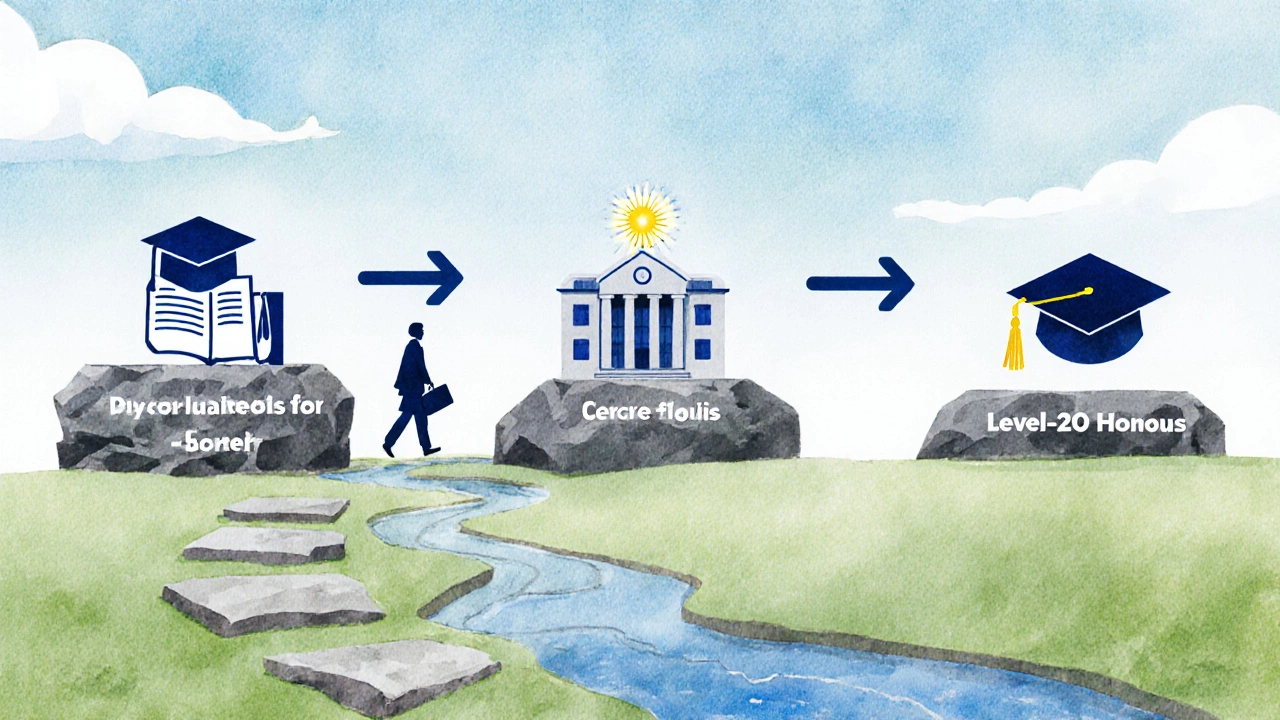Level 7 Qualification vs Degree: What’s the Real Match?
Level 7 vs Degree Comparison Tool
Level 7 Diploma
NZQF Level 7 120-240 Credits Industry-Focused
- Blends theory with practical skills
- Typically 1-2 years full-time
- Often used as stepping stone to degree
- Cost-effective option
Bachelor's Degree
NZQF Level 7 360 Credits Academic-Focused
- Research-heavy curriculum
- 3 years full-time
- Broad academic foundation
- Direct entry to higher studies
Key Differences
Credit Load & Duration
Diplomas: 120-240 credits
Duration: 1-2 years
Degrees: 360 credits
Duration: 3 years
Focus & Delivery
Diplomas: Practical, industry-specific
Degrees: Theoretical, research-based
Career Pathways
Diplomas: Direct employment or credit transfer
Degrees: Direct employment or advanced study
Cost Implications
Diplomas: 30-50% less expensive
Degrees: Higher overall cost
Comparison Summary
Both qualifications are recognized at NZQF Level 7, indicating comparable learning outcomes. The main differences lie in:
- Credit Load: Diplomas have fewer credits (120-240) compared to degrees (360)
- Focus: Diplomas emphasize practical application; degrees emphasize academic theory
- Flexibility: Diplomas offer faster entry into workforce or credit transfer pathways
- Cost: Diplomas typically cost 30-50% less than full degrees
Employers recognize Level 7 diplomas as equivalent to degrees for many roles.
Career Pathways
Pathway Options:
- Complete Level 7 Diploma → Apply for credit transfer to Level 8 degree (up to 50% credit transfer)
- Start with Level 7 Diploma → Enter workforce directly
- Go straight to Bachelor's degree for broad academic foundation
- Use Level 7 Diploma as foundation for Honours degree or postgraduate study
Credit transfer is facilitated by NZQA, ensuring alignment with university standards.
When you hear "Level 7" on a résumé or a course brochure, you might wonder if it’s just another name for a university degree. The short answer is: a Level 7 qualification in NewZealand sits right alongside a Bachelor’s degree in the national qualifications framework, but the details matter. Below we break down what Level 7 actually means, how it stacks up against a traditional degree, and what that means for your career or further study.
What is a Level 7 qualification?
Level 7 qualification is a credential placed on the New Zealand Qualifications Framework (NZQF) at the seventh tier. The NZQF is the government‑run system that ranks all learning outcomes from certificates (Level 1) up to doctorates (Level 10). Level 7 sits just below Level 8 (honours bachelor’s or graduate diploma) and above Level 6 (advanced certificate or diploma).
How does Level 7 compare to a Bachelor’s degree?
A Bachelor's degree is a Level 7 award that usually requires three years of full‑time study at a university or approved tertiary provider
Both a Level 7 diploma and a Level 7 bachelor's degree share the same framework level, meaning they are recognised as having comparable learning outcomes in terms of depth and complexity. However, the two differ in a few key ways:
- Length and credit load: A standard bachelor’s degree is typically 360 credits (120 credits per year), while a Level 7 diploma may range from 120 to 240 credits.
- Academic focus: Degrees lean heavily on theory and research, whereas diplomas often blend theory with practical skills aimed at specific industries.
- Pathways: A Level 7 diploma can act as a stepping stone into a degree (credit transfer) or directly into employment.
Typical Level 7 qualifications you’ll encounter
People often mix up the names, so here’s a quick snapshot of the most common Level 7 options:
| Credential | Typical Credit Load | Delivery Mode | Primary Goal |
|---|---|---|---|
| Bachelor of Arts / Science (University) | 360 | Full‑time or part‑time on‑campus / online | Broad academic foundation, research skills |
| Level 7 Diploma (e.g., Business Management) | 180‑240 | Part‑time, blended, or full‑time vocational college | Industry‑specific competence, employability |
| Graduate Certificate (post‑degree) | 120‑150 | Short‑course, often online | Specialised professional up‑skilling |
Why employers treat Level 7 like a degree
Many employers look for Level 7 credentials because the framework guarantees a certain depth of knowledge and skill
In practice, hiring managers often rank Level 7 diplomas higher than Level 6 certificates and on par with bachelor’s degrees for roles that require both theoretical understanding and practical capability. For example, a Level 7 Diploma in Project Management can be accepted for senior coordinator positions that traditionally require a degree, especially in industries like construction, IT, and health services.
How Level 7 affects further study
If you aim to continue onto a higher qualification, Level 7 is a solid launchpad. A common route is:
- Complete a Level 7 diploma (120‑240 credits).
- Apply for credit transfer into a Level 8 honours bachelor’s degree. Most universities will accept up to 50% of the diploma credits.
- Finish the remaining credits at the university level, gaining a full bachelor's degree (Level 8) or an Honours degree (Level 9).
This pathway saves time and money while still delivering a recognised degree. The New Zealand Qualifications Authority (NZQA) oversees the credit transfer framework, ensuring that your learning outcomes align with university standards
Choosing the right Level 7 option for you
Deciding whether to enroll in a Level 7 diploma or jump straight into a bachelor’s degree depends on a few personal factors:
- Career goals: If you need fast entry into a specific trade or role, a diploma may be quicker.
- Learning style: Some learners thrive in the structured, research‑heavy university environment; others prefer the hands‑on, industry‑focused setting of vocational colleges.
- Financial considerations: Diplomas usually cost less per credit and can be completed part‑time while working.
- Future education: If you plan an Honours degree or postgraduate study, a bachelor’s degree might streamline the process.
Talk to an advisor at a polytechnic or university, ask about credit transfer possibilities, and check the NZQF level definitions to see how your chosen program aligns with your long‑term plans

Common misconceptions cleared
Misconception 1: All Level 7 qualifications are identical.
Reality: While they share the same framework level, the content, delivery, and industry relevance can vary widely.
Misconception 2: A Level 7 diploma can’t lead to a degree.
Reality: Credit transfer agreements make it possible to convert diploma credits into degree credits at most universities.
Misconception 3: Employers ignore Level 7 diplomas.
Reality: Many sectors, especially in NewZealand’s applied fields, treat a Level 7 diploma as a strong indicator of job readiness.
Next steps: Getting started with a Level 7 pathway
Ready to decide? Follow these actionable steps:
- Identify the industry you want to work in and list the required qualifications.
- Search the NZQA database for Level 7 programmes that match your interest.
- Contact the institution’s enrollment advisor to ask about credit transfer options and entry requirements.
- Calculate total cost and time: compare diploma credit load versus full bachelor’s degree credit load.
- Enroll, and keep a portfolio of your work - many employers ask for evidence of competencies earned during a Level 7 diploma.
By following this roadmap, you’ll know exactly where a Level 7 qualification fits into your career puzzle and whether it truly equals a degree for your goals.
Frequently Asked Questions
Is a Level 7 diploma the same as a Bachelor’s degree?
Both sit at Level 7 on the NZQF, meaning they meet the same quality standards. However, a diploma usually has fewer credits and a stronger industry focus, while a degree is broader and more research‑oriented.
Can I transfer a Level 7 diploma into a university degree?
Yes. Most NewZealand universities accept diploma credits for transfer, often up to 50% of the total degree credits, provided the learning outcomes align.
Do employers treat Level 7 diplomas the same as degrees?
In many sectors-especially applied fields like health, engineering, and business-employers view Level 7 diplomas as equivalent to degrees for entry‑level and mid‑level roles.
How long does it take to complete a Level 7 diploma?
Typical programmes run 1‑2years full‑time, or 2‑4years part‑time, depending on credit load and delivery mode.
What’s the cost difference between a Level 7 diploma and a degree?
Diplomas generally cost less per credit (around NZ$150‑$200) compared with university degrees (NZ$250‑$300 per credit). Total tuition for a diploma can be 30‑50% lower than a full bachelor’s degree.





